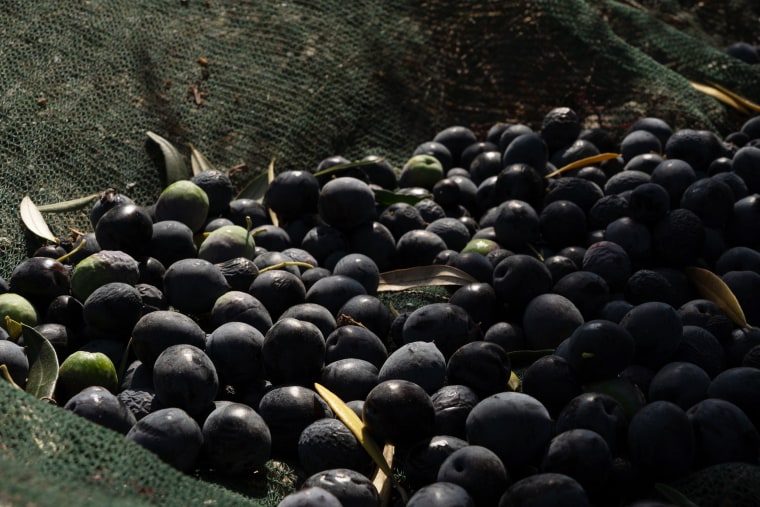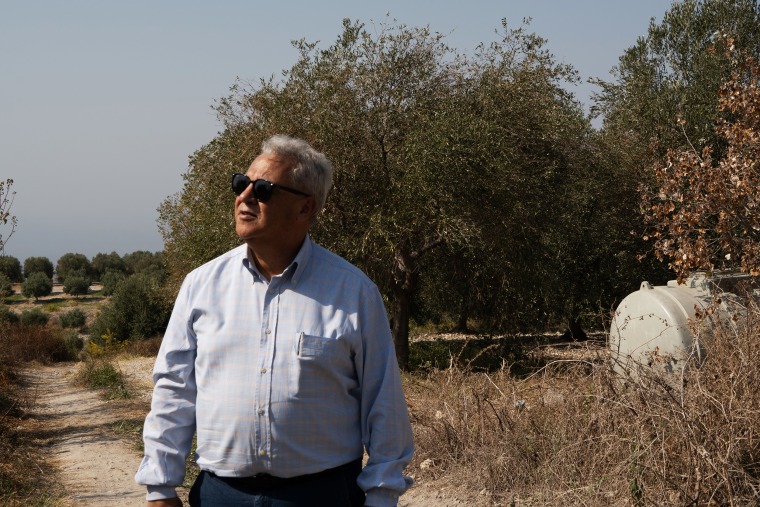AABRA, Lebanon — Mayada el-Sayed, 45, expertly collects ripe olives from trees, her fingers wrapped in duct tape to avoid bruising. Despite the constant threat of bombings, she remains focused on her task.
El-Sayed lives in fear of the regular airstrikes, one of which occurred less than a mile from her workplace at an orchard in Bustan El Zeitoun, situated not far from Lebanon’s Mediterranean coast and a short drive from Beirut. She is worried about her three children back home in Haret Saida, where multiple airstrikes have devastated homes and businesses.
The conflict escalated after Hezbollah began launching rockets into northern Israel in retaliation for the Hamas attack on October 7, 2023. Since the fighting erupted last year, Lebanese health officials report that over 3,600 people have been killed, with the United Nations refugee agency stating that 1.3 million individuals are now internally displaced.
On the Israeli side, authorities have reported around 100 civilian and military casualties due to Hezbollah’s attacks in northern Israel, the Golan Heights, and southern Lebanon over the past year, leading to the displacement of 60,000 civilians. Israeli Prime Minister Benjamin Netanyahu has promised to persist with military operations against Hezbollah until displaced families can safely reunite with their loved ones.
From Farm to Table
In the midst of loss and displacement, agricultural workers face a grave dilemma. Olives, a vital crop for the region, have seen significant destruction—with over 47,000 olive trees reported lost in southern Lebanon within just a month of the conflict, according to the United Nations Food and Agriculture Organization.
The situation worsened as Israel increased air and ground actions, deploying troops and tanks in September, which has complicated the harvest for local olive growers.
“Farmers are in a delicate situation. They invest a whole year in their harvest, relying on it for their livelihood,” said Walid Mushantaf, the manager of Bustan El Zeitoun.

According to Mushantaf, many farmers cannot reach their orchards, resulting in crops being wasted. He shared that he had helped rebuild the farm after the Lebanese civil war concluded in 1990, but the land is now at risk due to ongoing violence.
“I was raised in this village, and I recall my grandfather would nap under the olive trees during the summer,” he reminisced. “Those groves were like his sanctuary.”
El-Sayed lives with her husband and three children—Ahmed, 14, Zainab, 12, and another child—and she is the family’s main provider.
“We need to cover our expenses like rent, electricity, water, internet, and food. We have to work to survive,” she stated.
At the end of the workday, she returns home while 15 fellow workers continue to live in the grove.
Among them is Youssef Mukbil, a 32-year-old Egyptian, who depends on olive farming to support his two children, aged 11 and 13, who have ended up back in Egypt.
When they hear about nearby airstrikes, the workers rush to their homes, but the anxiety lingers on.

“When a strike sounds close, it’s terrifying,” Mukbil explained, expressing the fear that grips workers in these moments.
The ongoing conflict significantly impacted Rose Bechara Perini’s business, Dermmes, as her olive processing equipment was destroyed in a bombing. Many farmers from the nearby village of Deir Mimas have sought refuge in Beirut, hoping for a “miracle” to return to their homes and resume their livelihoods.
“Olive cultivation is our economy, our income, our heritage,” she emphasized. “It is the backbone of the village.”


